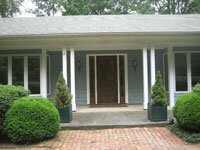NEWS- Overtaxed? Some sellers say assessments too high

This Ivy property is assessed for $749,000. It just sold for $599,000.
PHOTO ERIN HEISTERMAN
In the heated days of a soaring real estate market, houses were never advertised as "priced under assessment." That's because real estate assessments often seemed to be in a losing race with ever-escalating market prices, and houses were more likely to sell for waaaaay more than the tax man's estimate.
Those days are over.
After years of double-digit increases in property values– and consequently higher city and county taxes– recent listings in Albemarle County have enticed buyers with a new set of claims: prices $49,000, $67,000, and one a whopping $150,000 under assessment.
Meanwhile, CAAR, the Charlottesville Albemarle Association of Realtors, reports the median house price in Albemarle has dropped $15,000: from $326,000 in 2006 to $310,500 in the first half of 2007.
Has the Albemarle housing market tanked?
"I think there's definitely a little bit of correction," says CAAR boss Dave Phillips, who just released the midyear market numbers. "Albemarle is down only 4.8 percent. I hardly call that precipitous."
He does note, however, that the more the prices rose, the further they can drop.
The two localities to see a median price drop were Nelson County and Albemarle, but he's not too worried about one of them. "Albemarle benefited the most from the boom," says Phillips. "I don't think there's any serious issue with Albemarle."
Throughout the region, houses are staying on the market longer– 93 days compared to 69 a year ago– and that inventory remains high. In his second-quarter report for 2007, Phillips notes that "two years of insanity" have been replaced by a "leveling off at a rational level"– à la 2003.
But what about homeowners who enjoyed what Phillips calls "irrational price increases and crazy sales numbers" and now find that their real estate assessment has soared above market value? How does a house end up assessed $150K over the selling price, as is the case with a $599,000 Ivy listing valued on the county books at $749,000?
County assessor Bruce Woodzell is at a loss to explain that particular pricing situation, but acknowledges that some assessments will be over and some under market value.
He says about 25 percent of Albemarle's 2007 assessments have been done. "I think the market is very stable. We're going to see a small uptick in some, some are stable, and some will go down."
Woodzell attributes the drop in Albemarle's median house price to the condo market and a flood of lower-priced sales from developments such as Hessian Hills, Riverbend, Hollymead, and Barracks West (formerly Old Salem apartments).
Property assessments in Albemarle were based on peak 2006 data, says Phillips, and the market started to decline in November. Using those numbers from the market's high "couldn't be worse for homeowners," he says.
Realtor David Ferrall calls examples such as the $150,000-below-assessment extreme. "If I was a property owner paying taxes, I'd be upset," he says. He claims that a lot of houses in the county have been "aggressively" reassessed in the past year.
Woodzell doesn't like the word "aggressive," and points out, "My job is to assess at 100 percent market value."
Ferrall has another suggestion about the priced-below-assessment offerings: "I think some realtors are using [the assessment] as a marketing tool to show value."
Buyers who have to sell within a year are most hurt by higher assessments. "Those people are caught in a pickle," says real estate agent Roger Voisinet.
The houses he sees that haven't sold are those purchased at the 2005-2006 market peak by sellers who are now trying to add 10 to 15 percent to the price. "That's tough," he observes. And transaction costs add at least seven percent.
Even red-hot Charlottesville, where house prices rose 15 percent in 2006, has seen a slow-down in the annual climb which had been inflating 10, 11, and 12 percent in recent years.
"This year residential levels will probably be at two to three percent," predicts Barbour. "Maybe as much as five– but I doubt it."
Citizens are allowed to challenge the government's valuation of their property, but Barbour says he saw very few– 300– this year. "Most people are very knowledgeable," he says. "Even though they don't want to pay the tax, they know what [the property] is worth."
#